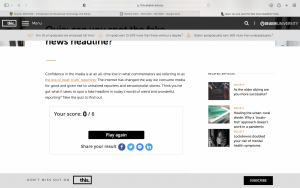Integrating Digital Literacy
Literacy is a crucial skill for learners and allows us to interact effectively with our world. As the world around us changes, so does literacy, and a part of that is developing our digital literacy skills. The NCTE has several goals for effective digital literacy, which include:
- Participate effectively and critically in a networked world;
- Explore and engage critically, thoughtfully, and across a wide variety of inclusive texts and tools/modalities;
- Consume, curate, and create actively across contexts;
- Advocate for equitable access to and accessibility of texts, tools, and information;
- Build and sustain intentional global and cross-cultural connections and relationships with others so as to pose and solve problems collaboratively and strengthen independent thought;
- Promote culturally sustaining communication and recognize the bias and privilege present in the interactions;
- Examine the rights, responsibilities, and ethical implications of the use and creation of information;
- Determine how and to what extent texts and tools amplify one’s own and others’ narratives as well as counter unproductive narratives;
- Recognize and honour the multilingual literacy identities and cultural experiences individuals bring to learning environments and provide opportunities to promote, amplify, and encourage these differing variations of language (e.g., dialect, jargon, register).
Digital literacy, especially the ability to recognize appropriate sources, is a skill I think is crucial for the future subjects I hope to teach. The skills outlined by the NCTE, such as engaging critically and determining a source’s narrative, are something I hope to focus on heavily in a social studies classroom. One article gives many examples of ways to teach these fact-checking skills, such as helping students identify bias with charts such as The Interactive Media Bias Chart or showing students different verification sites such as FactCan. I think before having students do any type of research or essay, it’s crucial that they learn how to find and identify reliable sources. Especially in social studies, where many political events are discussed, it’s crucial that students think critically about every source they encounter. By giving them resources like the media bias charts, students can begin to think about what they’re looking at. There are plenty of engaging ways to do this, such as the “spot the fake news headline” (which is harder than it looks) which would allow students an opportunity to think about why a source might be fake and have conversations with their peers about their thoughts. I also believe it’s important to develop these skills by engaging with and exploring sources with differing opinions to understand how a bias changes the intent of a source. It’s important to me that students can not only evaluate sources critically but evaluate their own thought processes.

I also believe that there is an opportunity to develop the skills needed for Digital literacy through math. One of the NCTE’s goals that I think fits well with this is “building and maintaining connections to solve problems collaboratively.” I think this could easily be done in a math classroom by offering an online space for students to collaborate on homework problems or other questions they may have. This helps students develop mathematical skills and teaches them the appropriate way to use digital spaces for partnership. I also think that including digital literacy in a math classroom allows for an opportunity to discuss issues of discrimination and lack of opportunity in math. This is a skill that is mentioned in the NCTE’s goals and could be achieved by having students learn about different cultures’ views on math as well as how certain groups have been oppressed and the impact this has had on present math.
Overall, I think digital literacy skills are increasingly important and can be taught in various ways, even without access to the internet. A lot of digital literacy centres around critical thinking, which isn’t exclusive to the online world. I believe in every class there should be an opportunity to apply and develop skills needed for digital literacy, regardless of the amount of time spent online.